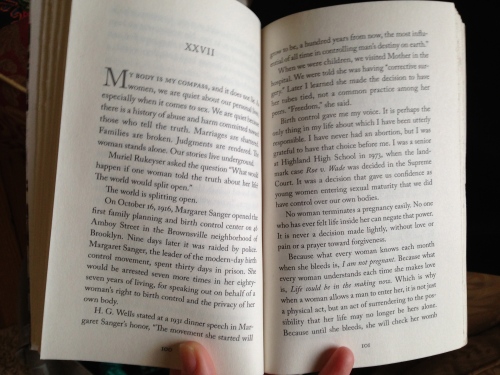Guest post today from my girl Bri, a fellow Chicago friend who had an epiphany about the controversial Robin Thicke song “Blurred Lines.”
Background: Thicke’s song received a lot of attention for being a tad rape-y and coercive with lyrics like, “And that’s why I’m gon’ take a good girl/I know you want it” and for his GQ interview in which he said, “We tried to do everything that was taboo. Bestiality, drug injections, and everything that is completely derogatory towards women. Because all three of us are happily married with children, we were like, ‘We’re the perfect guys to make fun of this.’ People say, ‘Hey, do you think this is degrading to women?’ I’m like, ‘Of course it is. What a pleasure it is to degrade a woman. I’ve never gotten to do that before. I’ve always respected women.'” Other people claimed that “we” were reading too much into a damn catchy beat and looking to get upset (which, yes, sometimes we do).
Bri wrote an awesome post today on FB about a street harassment incident where a group of guys used these lyrics to intimidate and objectify. She makes some excellent points about how the “blurred” space between good times and sexual assault can be the most dangerous space because of the erosion of boundaries and the expectations that some people have about “good times.” With her permission:
“I was walking from the red line stop to the green line stop. And, as feels inevitable at this point when walking anywhere, a group of guys verbally harassed me along the way, even following me for a bit at one point. It was nighttime, but I wasn’t really nervous/scared per se, since there were a ton of other people around, but it was still obviously obnoxious and embarrassing and shitty. So they’re yelling things like “that’s it, bitch! that’s my bitch!” which, whatever. (For men [or women I suppose] who maybe haven’t experienced this… it’s really not super out-of-the-ordinary for a lot of women in a lot of places… keep that in mind through the rest of this.)
But then they started singing Blurred Lines. Now, I understand that there’s both been a lot of people offended by Blurred Lines, as well as a lot of people totally confused by and antagonistic towards people who are offended by Blurred Lines. I was pretty offended when I first saw/heard the video/song. But as I talked through it with people, it was really hard for me to actually pinpoint a concrete reason that it made me so uncomfortable. It’s about a guy seducing a girl, and he’s using sexy language to do it – what’s so bad about that? I wondered what it was that made me uncomfortable. I read articles depicting the terms “good girl” and “I know you want it” as rape-y, which didn’t really seem fair. Sexually dominant? Sure. But that’s not a negative thing, people are entitled to be into whatever they’re into. So I set my discomfort aside and tried to enjoy this song that the rest of the world seems to love.
Until this event last week. 8-10 guys singing “you’re a good girl, you know you want it” at me cleared up very quickly why this song makes me, and many other women, uncomfortable, and why that’s totally justified, and why much of the world and Robin Thicke probably don’t get it.
It’s a trigger. Those words immediately trigger horrifying memories for a lot of women, myself included. A group of men singing those words at me brought back the EXACT sensation that I’ve had during horribly traumatic points of my life. “You’re a good girl” – instant horrible flashback. “You know you want it” – another horrible flashback, and the memory of someone justifying a terrible act they’re committing by convincing themselves that I want it.
And I don’t have statistics on this, but I would venture to say that not just mine, but a SIGNIFICANT number of cases of sexual assault occur when people are having a good time – at a party, being flirty, etc, after which things take a dark turn. So for Blurred Lines to be doing just that – blurring the line between a fun, upbeat, sing-a-long-style song that’s flirtacious and dirty and whatever, and a song that triggers such horrible, dark memories for me, is another trigger in itself. It totally mirrors some fun times that quickly turned into awful experiences.
The purpose of this post is really just to say: I understand more fully now why people are offended by this song, and I also get why people think people who are offended are totally overreacting. Because “you’re a good girl” and “you know you want it” should just be sexy, dirty, fun, with-a-wink language. In a perfect world, Blurred Lines would be a fun, dirty, sexy song, and that’s it. But it’s not. To a lot of women, those words (and consequently that video too) don’t just mean that. That’s not Robin Thicke’s fault, and I understand why he and most men and a lot of women can honestly and thoroughly enjoy the song. I’m just saying that it’s okay, too, to not be able to enjoy the song. I get it now. And I’d hope that everyone might understand a little better why being offended isn’t necessarily an overreaction – it’s a reaction to something that really has little/nothing to do with Thicke and has everything to do with words that trigger memories of horrible things that people do to other people.”
If you want more of Bri, follow her on Twitter here.
One other thing, the video for Blurred Lines has been “gender swapped” by Mod Carousel. How do we feel about fully clothed ladies and gyrating naked men? NSFW:
Related Post: On Ta-Nehisi Coates, street harassment and “Real Men”
Related Post: Guest Post: Dude, I Don’t Know If You’re a Player or a Slut















